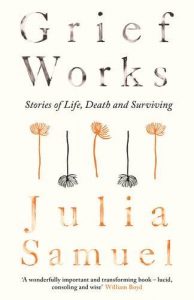 Stories of Life, Death and Surviving
Stories of Life, Death and Surviving
Published by Penguin Life 2 March 2017
304pp, hardcover, £14.99
Reviewed by Jessica Mann
There is a lot to do when someone dies. Telling family and friends, queueing for certificates, hanging on the telephone repeatedly being told that your call is important to the organization that is too busy to answer it, choosing what a coffin is to be made of, writing letters…it doesn’t leave much time for immediate mourning. Perhaps that does not matter. For if Julia Samuel’s book has one central message, it is that grieving takes a long, long time. Having spent twenty-five years as a bereavement counsellor, she is so empathetic that she suffers and weeps along with her patients or clients, men, women and children of every class and kind. But she is a consummate professional, and despite its sad subject, this book is so well written that it is a pleasure to read. It is also far more cautious and restrained than one would have expected from an author who was a friend of Princess Diana. Grief is not glamorous
The book’s aim is to serve as a guidebook to grief, a way of understanding it better and ‘living with a reality that we don’t want to be true’. Individual case studies make up much of the text, which is divided into sections – ‘When a partner/parent/sibling/child dies’ – rounded off with ‘Facing your own death’.
And since this is a serious work for professionals as well as patients, there is a 22-page bibliography.
The book is full of acute perceptions and surprising statistics: 4,400 people in England kill themselves each year, one every two hours. Men tend to start new relationships within a year of their partner’s death. A bereaved person is six times more likely to suffer heart disease than the national average. But as well as such facts, there are also chapters of advice based on long experience as a psychotherapist. Although Samuel says it is impossible to write a prescriptive list of what may help us in our grief, she is in fact quite prescriptive, not to say occasionally bossy, though always sensible and practical.
Do exercise, you’ll feel better afterwards. Friends of the bereaved must realize they are in for the long haul. Children should be told the truth, however bleak it is. Above all, get ready well in advance. ‘We should all try to talk, plan and prepare for death long before we are actually faced with the end of our life.’
All the advice is excellent and sensible; the case studies are absorbing and illuminating; the autobiographical moments touching. Julia Samuel weeps for her clients but also with them. She says, ‘Every bereaved person I have worked with has left their mark in me.’ She remembers all her clients, almost none of whom come from the pre-1960s generation. They (or, I confess, we) ‘don’t tend to seek therapy when a partner dies, having been brought up to be self-reliant.’ I have to admit that in the months since my own husband died, it has never so much as crossed my mind that a psychotherapist could help me. I must be as typical of my inhibited generation as Julia Samuel is of her touchy-feely contemporaries. But what an admirable example she is. How strong a person must be, who can take into herself other peoples’ grief, an emotion that ‘eschews avoidance and requires endurance and forces us to accept that there are some things in this world that simply cannot be fixed.’
